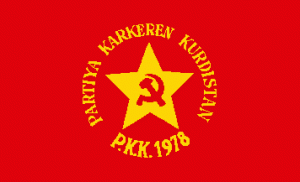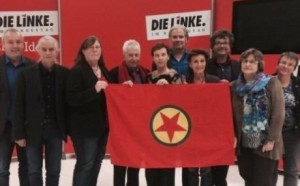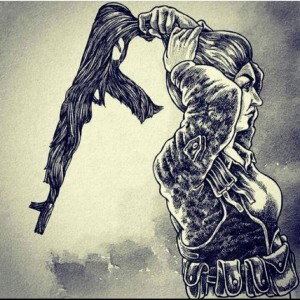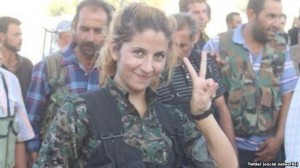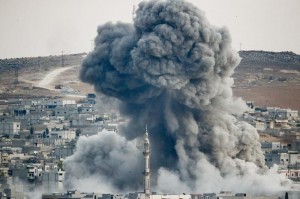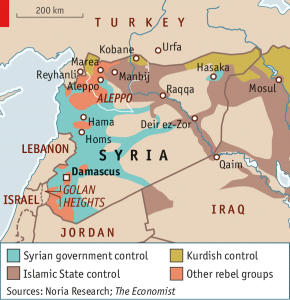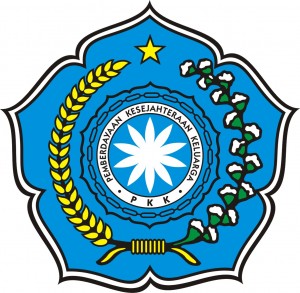The subject of my digital research project was the Kurdistan Worker’s Party, also known by their Kurdish initialism, the PKK. I focused both upon its history and current activities as a member of the anti-Islamic State coalition, as well as its relationship with Turkey, its status as a terrorist organization, and its practices of gender equality. This project has deepened my understanding of the complex historical factors that influence the current conflict with the Islamic State. Continue reading Final Blog Post
The Peace Talks are Falling Apart, and the State of Gender Equality in Turkey

My first diigo post this week was a news report on the BBC about the peace talks between Turkey and the PKK. In this news article, a PKK commander claims that while the both sides leadership desires to move forward with the peace process, the peace talks with Turkey are in danger of turning into conflict. Cemil Bayik, a PKK commander in the Qandil mountains, says that the Turkish government’s treatment of Kobane shows that it still views the PKK and the Kurdish people as a bigger threat than ISIS. Meanwhile, a Turkish government official, Yasin Aktay, vice-chairman of the ruling AK Party, gave a statement saying that the PKK and the Kurds are using current time of instability to try to “upset the status quo”, and try to set up a system of self-governance like Iraqi Kurdish groups. This article ends with dire warnings by both sides. Aktay warns that in the coming weeks and months, Turkey will actively try to prevent a “power grab” by the PKK in Kurdish towns. Meanwhile, Cemil Bayik says that unless the Turkish government changes its policies, the conflict between the Kurds and Turkey will continue, asserting that “if necessary the Kurds will fight against the Islamic State and the Turkish army”. None of this bodes well for the peace process, and it seems like the next few weeks will bring only escalating conflict between the two groups. Kurdish groups continue to hold rallies in support of Kurdish fighters in Kobane in the Turkish capitol (pictured above). This article is fairly unbiased, and interviews leaders from both sides of the conflict, so it is difficult to say which perspective on globalization it holds.
My second diigo post this week was a news report about a speech Turkey’s President Ergodan made about gender equality. The Turkish President was subject to international criticism after his remarks at a gathering in Istanbul aimed at discussing women’s rights and freedoms, in which he said that gender equality is “against nature”. In his speech, Ergodan stated that Islam has defined a role for women in society, and that that role is motherhood. He also offered a strong admonishment to Turkish feminists, whom he says have rejected motherhood. Women’s and human’s rights activists have consistently criticized Ergodan and the AKP party since they came into power in 2003, claiming that Turkey has increasingly become authoritarian and politically conservative. While this article is not directly about the PKK and the Kurdish people, I thought it was important to address gender equality in Turkey, particularly as there is currently such debate about whether the PKK actually practices gender equality. According to World Economic Forum’s 2013 Gender Gap Index, Turkey is ranked 120th of 136 nations in gender equality. As this is an article in the Hurriyet Daily News, a Turkish newspaper, this article is certainly less critical of Ergodan than other articles I read about the same event. A good subject for my final paper would be comparing gender equality in the PKK and Turkey.
Germans and the PKK: an Unlikely Romance
My two blog posts this week were about how the PKK has an unexpectedly high degree of support in Germany. My first post is an article for Al Monitor, a news site launched during the Arab Spring which brands itself as “the pulse of the Middle East”. In it, a physician from Hamburg talks about her more than 20 years in the Kurdistan Workers Party in a rare interview. Dr. Medya joined the the PKK in 1993, after she saw the aftermath of the conflict between Turkey’s security forces and the PKK, in which several Kurdish villages were burned. She has since served as a combat medic in the PKK and as a family doctor in Kurdish villages. Many westerners have joined the PKK in the last few months because they want to fight the Islamic state, but according to Dr. Medya, they “cast the war against IS in religious, rather than political terms”. Dr. Medya was motivated to join by the plight of the Kurdish people, whom she describes as “a people who suffered a lot but never lost hope and knew what to do to achieve their aim, even if this meant losing their lives”.
My second post is a news report in Rudaw, an online Kurdish news network. On November 14, 10 members of the German Parliament unfurled the PKK’s flag (pictured above). This move was in support of both the PKK and Nicole Gohlk, a fellow MP who lost her parliamentary immunity last month after waving the PKK’s flag at a pro-Kurd rally in Munich. According to the ten MPs, Germany should no longer classify the PKK as a terrorist organization, particularly in light of its contributions in the coalition against the Islamic State. Initially, it did not make sense to me that there would be so much support for the PKK in Germany. However, upon further research, I found out that Germany has a very large Kurdish immigrant population. Furthermore, many Westerners see the PKK as one of the few Marxist liberalization movements, and also sympathize with and support the ideas the PKK’s tenets of marxism, environmentalism, and gender equality. These two articles suggest that there is a growing degree of support for the PKK in the West, which may in turn lead to increased support in a separate Kurdish nation.
Female Fighters and Peace Talks Between the PKK and Turkey
This week, my two diigo posts were about female fighters in the PKK and the PKK’s peace talks with Turkey. My first post is a tweet of a drawing by Sazan Slemani, a Kurdish woman who is very active on Twitter in support of the female fighters of the YPG, a branch of the PKK. In the drawing, a female PKK soldier is depicted putting her hair up in a ponytail, as if in preparation for a battle, and as her hair flows down from her hands, it changes into the shape of a gun. While art critique is not exactly my forte, I found this image to be really moving. I thought it was particularly interesting how long hair, which typically symbolizes femininity, was paired with something traditionally masculine like assault rifles and war. The popularity of images like this is evidence of the growing positive perception of the PKK: people are inspired by female soldiers, particularly when they are fighting against IS, a group under which women suffer numerous abuses. The PKK certainly benefits from its perception as an advocate of gender equality, but whether or not it actually practices it is a question for my final paper. The author is a Kurdish woman, and a strong advocate for the PKK on social media, but it is difficult to tell which perspective on globalization she identifies with based purely on her artwork. However, her use of social media to create and communicate with network of PKK supporters all over the world is something that a cosmopolitan would certainly appreciate.
My second diigo post is a report published on November 6, 2014 by the International Crisis Group about the current peace talks between Turkey’s President Ergodan and leaders of the PKK. It discusses how after decades of conflict which cost tens of thousands of people their lives, neither Turkey nor the PKK believe that military victory is possible, and are meeting to discuss a peaceful resolution. However, the events in Syria has reignited ever-present tensions between the two groups, and a fruitful compromise between them is seeming less likely. In this report, the International Crisis Group details the parameters of a possible peace deal, and states that differences need to be put aside so that basic issues like “transitional justice, disarmament and decentralization” can be resolved. It is clear that this is a group of political liberals: they advocate solving this issue through diplomacy, and by bringing both parties to the same table, rather than by individual, lone-wolf states.
PKK: Terrorist Group, or Bastion of Gender Equality?
This week, my two posts were about the PKK’s status as a terrorist group and whether its claims of gender equality are actually factual. My first post is an article published in The New Republic, an American left-leaning political magazine, in which the author, French philosopher Bernard Henri-Levy, argues that the PKK should no longer be considered a terrorist organization. He cites four “factors” as evidence. First, that though the PKK committed terrorist acts in the ’70s and ’80s, the organization renounced violence in 1999, and secondly, that it has transformed since then into an entity that advocates for the Kurdish State with “dialogue and confederation”. Henri-Levy also claims that the PKK should not be considered a terrorist group because they have acted so effectively in the coalition against the Islamic State. Lastly, he argues that the organizations Marxist-Leninist roots have made it a strong supporter of moderate Islam, secularism, and gender equality, and that in order to support the spread of those ideals in the Middle East, Western powers should support the PKK. I would disagree that the PKK has renounced violence: in 2004, the group returned to guerrilla tactics and attacks in southern Turkey became frequent. Henri-Levy seems to take the political liberalist’s approach, arguing that the PKK is necessary to the multilateral coalition to defeat the Islamic State.
My second diigo post is partly a news report and partly a discussion of gender equality in the PKK. On October 27, rumors began to spread on social media that a Kurdish female fighter known by the pseudonym Rehana may have been beheaded by Islamic State militants in Kobani. Rehana became the face of the PKK’s female fighters after a photo (pictured above) of her making the victory sign was retweeted hundreds of times on Twitter. An image of a beheaded woman whom IS fighters claim to be Rehana was posted on pro-IS social media sites on the 27th, but it is impossible to verify whether the photo is genuine. The author goes on to discuss the complicated history of gender equality in the PKK. Currently, the group has the largest female militia in the world, and has a history of feminism rooted in it’s founder Abdullah Ocalan’s ideology. However, the author cites claims made by Berfu Kiziltan about how while the PKK has historically recruited women as well as men, in its early days, recruitment was sometimes by force. The author also mentions the PKK’s history of female suicide bombers, as well as a recent suicide bombing in Kobani carried out by a female PKK soldier. The author remains unbiased in her discussion of the PKK and gender equality, so it is difficult to determine which perspective on globalization she has. If anything, I would say that she is also a political liberal, because she seems to value the contributions of the PKK in the anti-IS coalition, as part of a multilateral approach.
Kurdish Fighters in Kobane, and the PKK’s Rhetoric about Gender Equality
This week, my two articles were about Kurdish fighters. The first one was a news report about developing events in Kobane. On October 20, after mounting domestic and international political pressure, the Foreign Minister of Turkey Mevlut Cavusoglu announced that Turkey will allow some Kurdish forces to cross the border into Syria to fight the Islamic State in the Syrian town of Kobane. Turkey will not allow all Kurdish forces to fight, and will only allow the Peshmerga, rather than the PKK, to cross the border. “Peshmerga” is a Kurdish word for armed fighters, but more specifically refers to nationalist soldiers for an independent Kurdish state. The Peshmerga are not associated with the PKK, which Turkey views as a terrorist organization. My second post was about gender equality in the PKK. Over the past few months, there have been dozens of articles published about how Kurdish women of the PKK have been engaged in combat against the Islamic State. I’ve attached a picture of female PKK fighters above. In an article in the Hurriyet Daily News (a major Turkish newspaper), Berfu Kiziltan examines the PKK’s claims about being an organization that practices gender equality. Rather unsurprisingly for a Turkish author, he argues that the PKK’s history of terrorism, in particular its use of female suicide bombers, is ignored in recent news articles, and that the organization has a long history of abuses towards women. In regards to the last article, it is hard to determine how credible the author’s argument is. It is clearly biased, but that not necessarily mean it is not factual or correct. Members of the PKK say that allowing females to participate in all PKK activities, even terrorist ones, allow women to prove that they are just as capable as men. The author’s argument about female suicide bombers has left me with some questions to consider: Is allowing women to be suicide bombers an abuse towards women, or is it promoting (albeit in a rather twisted way) gender equality? And does gender equality even matter when the perpetrator will be blowing up buildings filled with civilians?
Kurdish Fighters in Kobani and the History of Turkey and the PKK
This week, I’ve decided to focus on the history of the conflict between Turkey and the PKK, and how that history is now affected Turkey’s involvement in the anti-ISIS coalition. Right now, Kurdish and ISIS forces are fighting for control of the Syrian city of Kobani, located close to the Syrian-Turkish border. Above is a photo of the town of Kobani immediately after an airstrike. My first Diigo post is an article by Al Jazeera detailing the history of Turkey’s conflict with the PKK from 1920 to 2013. I chose this article because while I felt like I had learned a lot about the conflict up until the Gulf War, I still needed some background information to fully understand how Turkish and Kurdish relations currently affect the conflict with ISIS. I did not know that the conflict was still active in 2013, with a ceasefire only being called by Ocalan (the PKK’s founder) on March 21 of that year. My second Diigo post was a news report in International Business Times. It covers quite a bit of information, as a lot has happened during the past week in regards the conflict with ISIS. The US has declared support for the PKK and other Kurdish forces, because they are fighting against ISIS. Meanwhile, Turkey’s President Ergodan, has condemned the US for supporting the PKK, as the US and Turkey are long-standing allies, and the PKK and Turkey have been embroiled in a decades-long conflict. Kurdish fighters are currently battling ISIS forces in the Syrian town of Kobani, and Turkey is opposing giving the fighters any weapons, and equating them with the PKK. Both sources appear to be neutral, but they both tend to speak of the Kurdish people as a united state, rather than just a network of people, so the authors might have a more political realist than cosmopolitan perspective. Turkey’s president Ergodan is extremely concerned with maintaining a strong Turkish presence in southern Turkey, and not letting the current war with ISIS allow Kurdish groups in the area gain autonomy. His goal of protecting interests by maintaining a strong state and his unilateral approach leads me to think he is a political realist.
The PKK and Turkey Don’t Get Along. This is Bad.
This week, my two Diigo posts were about the relationship between the PKK and the Turkish government and how that relationship affected Turkey’s response to the ISIS conflict. Turkey and the PKK have a decades long history of conflict that has continued to this day: recently, the PKK torched Turkish schools because the Turkish government failed to provide Kurdish-language classes in Kurdish schools and forcibly shut down any private Kurdish language lessons even after an agreed upon treaty that would allow them. While this conflict has lead to plenty of problems on its own, it has greatly complicated Turkey’s response to ISIS.
My first Diigo post is an opinion piece written by Cegniz Aktar, Senior Scholar at the Istanbul Policy Center, a director at the UN, and one of the leading advocates of Turkey’s integration into the EU. In this piece, Aktar argues that Turkish politician “fearing the birth of a Kurdish nation-state more than anything but eager on the other hand to assert their regional supremacy, are ending up by alienating all three Kurdish communities” in Iraq, Syria, and Turkey. He is referring specifically to President Ankara making a speech comparing the PKK to ISIL, a few days after stating that the PKK should be fighting ISIL rather than Turkey. Even though the Turkish government has been an economic partner of the Iraqi Kurds, they have offered them no military support, and have also preventing Turkish Kurds from joining the fight against ISIL. The Turkish government’s fear of a sovereign Kurdish state is leading to extremely poor diplomatic outcomes, and making it much easier for ISIS to take military action. The map above depicts the regions in which various groups have control, as of October 4, 2014.
My other post is This is a news report by The Economist about the Turkish government’s reaction to ISIL’s assault on Kobane, a Kurdish town in Syria on the border of Turkey. This town is one of three enclaves that are governed by the Kurds. Turkey ceded the area to PKK control, but PKK leaders claim that by not assisting in the fight, the Turkish government is indirectly supporting ISIS. Even though Turkey is a member of the coalition to fight ISIS, its unwillingness to treat the PKK as a legitmate governing body or offer them any assistance is allowing ISIS to gain ground.
History and Global Perspectives about the PKK
I’ve figured out what the focus of my social bookmarking project will be: the Kurdistan Workers’ Party, also known by its Kurdish initialism, the PKK. The PKK is really interesting to me because its perception and portrayal by Western media has changed very radically in the last few years. Though the United States still lists the PKK as a terrorist group (in response to Turkish political pressure), the American military has provided air support to aid the PKK in its conflict with ISIS. My first article this week was a report published in 2007 by the Council on Foreign Relations about the PKK. The report appears unbiased, but discusses the group’s guerilla tactics and terrorist acts, as well as the history of institutionalized discrimination against the Kurds in both Turkey and Iraq. My other Diigo post was much more recent. It is a news report by Hurriyet News, an online newspaper based in Istanbul. In it, the President of Turkey talks about how, to the Turkish government, ISIS and the PKK are equivalent terrorist organizations. It is interesting how the Western viewpoint on the PKK has become much more positive with their involvement in the Iraqi war and the current ISIS conflict, while Turkey, with a history of decades of conflict with Kurdish separatists, has not altered its stance.
The History of Kurdistan and its role in the US/ISIS Conflict
This week, my two Diigo posts were about Kurdistan. I’ve read news reports about Kurdish forces’ involvement in the conflict with ISIS, but I wanted to learn more about the history of Kurdistan in order to more deeply understand the Kurdish people’s cooperation with the United States and Iraq. My first post was a website with a timeline and the history of the Kurdish people starting at the 7th century. I found it interesting that the Kurdish people are the world’s largest ethnic group that do not have a country of their own. The country with the largest number of Kurds is Iraq, and the Kurdish people have a history of conflict with the Iraqi government. Currently, Kurdistan is not legally separated from Iraq, but acts independently from the Iraqi government. This has enabled them to take strong defensive and offensive military action against ISIS, even after the Iraqi military fled areas of Northern Iraq/Kurdistan. My second post is an NPR segment and interview with the New Yorker’s Dexter Filkins, a reporter who has spent several years living and working in Kurdistan. He talked about the history of Kurdistan in Iraq, and how the Kurdish peoples’ history of military conflict with the Iraqi government, and relative independence have allowed them to really successfully repel ISIS forces. In this interview, Filkins gives the impression that he is a skeptic- he tends to speak about these issues in terms of states, but seems to favor a more collective approach to dealing with ISIS, and warns against military action as the exclusive way to solve the ISIS problem. He claims that airstrikes alone could eventually lead to further instability.
A map of areas occupied by the Kurdish people.
